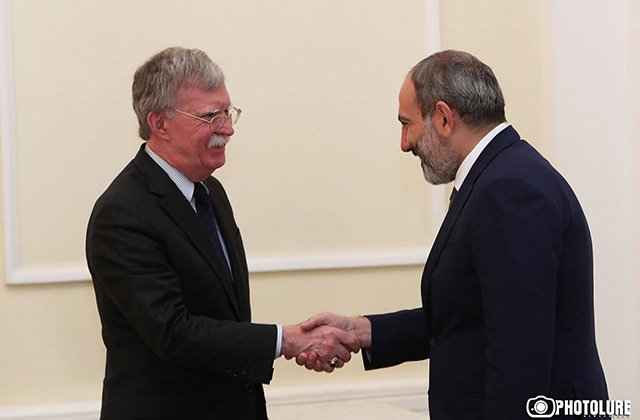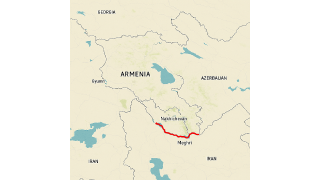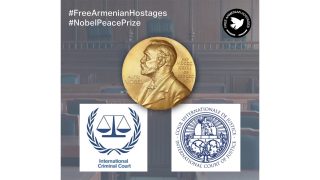
Trump’s national security adviser tries to distance Armenia from Russia and Iran

John Bolton, the National Security Adviser of Pres. Trump, visited Russia, Azerbaijan, Armenia and Georgia in October, conveying the White House position on regional and international issues. Bolton is known as a hawk on foreign policy and is often described as a warmonger for his extremist positions!
In his meetings with Armenian officials, Bolton spoke about U.S. sanctions on Iran which may affect third countries, including Armenia. He also made a surprise offer to sell American weapons to Armenia and discussed Armenian-Turkish relations, and the resolution of the Artsakh conflict.
It became clear that Bolton tried to distance Armenia from its strategic ally Russia and key trading partner Iran, since the border with Armenia is blockaded by neighboring Azerbaijan and Turkey.
Even though serious concerns were expressed by many Armenian commentators and particularly Russian officials regarding the policies advanced by Bolton, Acting Prime Minister of Armenia, Nikol Pashinyan, was surprisingly upbeat and told the Armenian Parliament: “I’ve met with Bolton. There wasn’t even the slightest nuance during this meeting which can cause disturbance in Armenia and among the Armenian people. I consider this meeting to be a major diplomatic achievement for us, I will say in the future as to what is the reason that I am saying so.”
The Acting Foreign Minister of Armenia Zohrab Mnatsakanyan added: “The dialogue [with Bolton] was very successful, and the US understood the logic of our relations with the Russian Federation, Iran, our position on the Nagorno-Karabakh issue, relations with Turkey, etc.”
Putting a positive spin on his meetings in Armenia, Bolton tweeted: “Yesterday I had a nice visit to Armenia, an important friend in the region. I enjoyed productive conversations with the [Acting] Prime Minister and his national security team.”
Despite the heated relations between the United States and Russia, Armenia has to maintain a delicate balance between the two superpowers. On the one hand, Armenia relies on Russia for its critical needs: weapons, energy, and trade, and therefore, cannot afford to antagonize its strategic ally. On the other hand, Armenia has maintained friendly relations with many other countries, particularly Western Europe and the United States.
Proposed Sale of Weapons to Armenia
Bolton surprised his Armenian hosts by offering them to purchase American weapons by stating that they are superior to those of Russia. However, he did not mention how impoverished Armenia would be able to pay for these weapons. As we know, Russia supplies the bulk of Armenia’s weapons either by providing loans or at discount prices. Pashinyan responded by stating that Armenia will consider the American offer, while Acting Defense Minister Davit Tonoyan told NEWS.am that there was no need to purchase U.S. weapons at this time.
By acquiring American weapons, Armenia would risk antagonizing Russia, its main source of arms. Secondly, the United States may be using its offer to Armenia as a cover to sell multi-billion dollars of advanced weapons to Azerbaijan, something it can afford to purchase, while Armenia cannot.
Bolton’s other illogical statement was that the Russian sale of weapons to Armenia and Azerbaijan has hampered the settlement of the Artsakh conflict. Ironically, this is exactly what Bolton is proposing by offering to sell U.S. weapons to both countries. In my opinion, the United States and all other countries should refrain from selling weapons to both Armenia and Azerbaijan! Pouring more weapons into a conflict zone can only to lead to increased violence and deaths on both sides.
Armenian-Iranian Relations
In response to Bolton’s statement that the United States will enforce sanctions against Iran “very vigorously” and for that reason the Armenian-Iranian border is “going to be a significant issue,” Pashinyan stated that Armenia as a landlocked nation does not have diplomatic relations with either neighboring Turkey or Azerbaijan, so it must retain “special relations” with its other two neighbors — Iran and Georgia — which are Armenia’s only “gateways” to the outside world. Pashinyan optimistically told the Armenian Parliament: “I think that the position of Armenia was clear, comprehensible and even acceptable to representatives of the U.S. delegation.”
Rather than pressuring Armenia to disrupt its critical trade relations with Iran, the United States should be urged to pressure Turkey and Azerbaijan to open their borders so Armenia can trade more easily with and through all four of its neighbors. Pashinyan correctly pointed out that the Republic of Armenia has its own national interests which do not always coincide with the interests of other countries. In my view, the United States has no right to demand that third countries comply with its misguided sanctions on Iran. Furthermore, since the United States is exempting Turkey from implementing U.S. sanctions on Iran, why shouldn’t Armenia be also exempt from these sanctions? Besides, Bolton acknowledged that the United States does not “want to cause damage to our friends in the process.”
Relations with Turkey
Bolton declared that the resolution of the Artsakh conflict would help open Turkey’s border with Armenia. Pashinyan responded by stating that Armenia is ready to establish relations and have open borders with Turkey, however, without any preconditions which Turkey tried to impose by linking the opening of the border with the Artsakh conflict. To counter Turkey’s precondition, I suggest that Armenia impose its own precondition by linking the opening of the border with Turkish recognition of the Armenian Genocide!
Resolution of Artsakh Conflict
Bolton suggested that the December 9 Parliamentary elections, during which Pashinyan’s political party is expected to win the majority of seats, will give him a strong mandate to take decisive steps in the resolution of the Artsakh conflict. Bolton did not seem to be aware of Pashinyan’s repeated statements that “the ones who determine whether to resolve or not resolve the Karabakh conflict are the Armenian people, and specifically the people of Armenia, the people of Artsakh and in this case also the Diaspora, because this is a Pan-Armenian issue.”
As Armenia is facing both internal and external uncertainties, it is mandatory that Armenians worldwide support their homeland and join forces against their common adversaries!
By Harut Sassounian
Publisher, The California Courier
www.TheCaliforniaCourier.com























